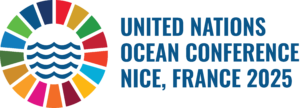
Engagement Hub / Events
UN Ocean Conference

June 9 @ 08:00 – June 13 @ 17:00 BST
The 2025 United Nations Conference (UNOC) will be co-hosted by France and Costa Rica and held in Nice, France, from 9 – 13 June 2025. The Conference builds on two previous UN Ocean Conferences, hosted by Sweden and Fiji in 2017 in New York and by Portugal and Kenya in 2022 in Lisbon.
The overarching theme of the Conference is “Accelerating action and mobilizing all actors to conserve and sustainably use the ocean”. The Conference aims to support further and urgent action to conserve and sustainably use the oceans, seas and marine resources for sustainable development and identify further ways and means to support the implementation of SDG 14. It will build on existing instruments to form successful partnerships towards the swift conclusion and effective implementation of ongoing processes that contribute to the conservation and sustainable use of the ocean.
Aquatic Blue Food Coalition at UNOC
The Ocean That Feeds Us
Ocean sustainability: trade and blue food house at the Green Zone (La Baleine)
28 May-14 June | Palais des Expositions – Nice Acropolis
The ocean, covering over two-thirds of the Earth’s surface, is crucial for providing food and nutrition, generating oxygen, absorbing greenhouse gases, and supporting national economies, including through international trade. Ocean-based food sources, including those of fish, shellfish, marine plants and algae, and mineral origins, are rich in essential proteins, fats, diverse micronutrients, and vital minerals. Marine resources and seaways are indispensable for ensuring food security and nutrition, especially as global food systems and livelihoods face increasing threats from overfishing, biodiversity loss, climate change, and pollution from plastics and heavy metals. As the global population grows, we must produce more with less, and the ocean, with its diverse and nutritious food supply, is a key part of the solution.
The Trade and Blue Food House will bring people together to share knowledge, highlight innovative and scalable solutions, and promote international cooperation for sustainable ocean-based food systems, trade, and value chains. It will showcase best practices, especially from developing countries and for small-scale actors, and underline the need for clear, harmonized standards in sustainable fishing and aquaculture. The House will also advocate for responsible trade in ocean foods, showing how it can support both ocean health and biodiversity. By emphasizing the economic value and nutrition and livelihood contributions of blue foods, the initiative aims to raise awareness among all the participants of the UN Ocean Conference.
Co-organized by UN Trade and Development and Aquatic Blue Food Coalition in cooperation with the Food and Agriculture Organisation of the United Nations, all with the kind support of France and the Republic of Angola.
Aligning UNOC, UNFSS, and COP30 for sustainable aquatic blue food systems
Tuesday 10 June | 17:15-18:45 | Trade and Blue Food House (Green Zone)
Join us for a discussion on the critical role aquatic blue foods play in advancing the SDGs across major international convenings in 2025, including UNOC, Bonn SB62, UN Food Systems Summit +4, and COP30. Featuring diverse perspectives from small-scale actors, researchers, funders, and policy experts, this panel will explore key opportunities for progress in global dialogues on oceans, food systems, and climate. The discussion will be followed by an Aquatic Blue Food Coalition networking event.
Advancing blue foods for sustainability, food security, and livelihoods
Wednesday 11 June | 17:30-18:45 | Blue Zone Room 3
Since the last UN Ocean Conference, champions from government, finance institutions, cooperatives, academia, and civil society have accelerated action on aquatic blue foods for nutritious, equitable, sustainable, and climate-resilient food systems. These actions have supported 9 of the 17 SDGs, including SDG14.
Co-chaired by two ministers, this side event highlights progress and new commitments, showcasing leadership by government representatives from Iceland, Norway, Madagascar, and other champions. It spotlights research and advocacy efforts to advance sustainable blue foods in the context of climate change. The session will also officially launch an inaugural financial investment by the Aquatic Blue Food Coalition to support the integration of aquatic foods into national priorities.
Organizing partners: Government of Iceland; Peter Thomson, UNSG’s Special Envoy for the Ocean; European Union; Government of Japan; Government of Madagascar; Government of Ghana, Ministry of Fisheries and Aquaculture, Government of Canada; Ministry for Economic Cooperation and Development, Federal Government of Germany; Government of Norway; Ministry of Marine Affairs and Fisheries, Government of Indonesia; Department of Agriculture, Government of the Philippines; Aquatic Blue Food Coalition; School Meals Coalition; Global Action Network Food from the Oceans and Inland Waters for Food Security and Nutrition; Environmental Defense Fund; Stanford Center for Ocean Solutions; Oceana; African Union Development Agency); CARE; WorldFish; Food and Agriculture Organization of the United Nations; Global Seaweed Coalition; European Bureau for Conservation and Development; UN Climate Change High-Level Champions; Marrakech Partnership for Global Climate Action – Ocean Breakthrough; African Women Fish Processors and Traders Network (Awfishnet Nigeria Chapter); Sophia University Island Sustainability Institute; Institut de Recherche pour le Développement; Marine Stewardship Council; Monterey Bay Aquarium; World Resource Institute; Rare; Meridian Institute; Walton Family Foundation; Gordon and Betty Moore Foundation; Foundation Erol; Builders Vision; World Economic Forum